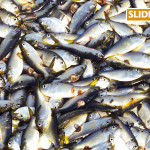
The Neuse Riverkeeper Foundation and Waterkeeper Alliance issued a Notice of Intent to sue the current and former owners and operators of the Stilley swine feeding operation this week to stop illegal discharges of swine waste into groundwater, wetlands and streams that flow to the Trent River.
[blackoutgallery id=”318072″]
The Stilley Facility, which confines more than 11,000 swine near Trenton, NC facility for Murphy Brown, LLC—a subsidiary of Smithfield Foods, Inc.—has a long history of illegal discharges and waste management problems. The groups will file suit under the federal Clean Water Act and Solid Waste Disposal Act if action is not taken to stop the swine waste discharges and clean up the facility within 90 days.
Swine waste contains pathogens, nitrogen, phosphorus and other pollutants that can cause fish kills, endanger swimmers, promote blooms of toxic algae and contaminate drinking water when discharged into public waters. The Stilley Facility is discharging pollutants from swine waste into tributaries of the Trent River, which flows into the Neuse Estuary. The Trent and Neuse Rivers drive the economy in this region; however, the Neuse Estuary regularly experiences algal blooms, fish kills and depletion of oxygen necessary to sustain the fishery as a result of excessive amounts of phosphorus and nitrogen pollution.
“The Neuse Riverkeeper Foundation is working to restore water quality in the Neuse Estuary and its tributaries which have been plagued by algal blooms and fish kills for far too long,” said Jim Kellenberger, president of the Neuse Riverkeeper Foundation.
“We must take action to address the mismanagement of swine waste and pollution discharges at animal feeding operations if we want to restore the estuary and protect our fisheries, communities and recreational use of this important North Carolina natural resource, which serves over a million citizens of this area.”
The North Carolina Department of Environment and Natural Resources (NCDENR) acknowledges that its efforts to reduce pollution for nearly two decades have failed to achieve “any significant decrease in actual nutrient loading to the estuary” and that phosphorus pollution of the Trent River has actually increased. NCDENR often claims that animal feeding operations in the Neuse Basin operate under “no-discharge” permits, but also admits that swine waste is commonly and directly discharged to public waters from these operations through ditches and tile drains—a violation of both state and federal law—and that the agency lacks understanding of the magnitude of pollution coming from animal feeding operation lagoons and sprayfields. The Clean Water Act and Solid Waste Disposal Act contain provisions allowing citizens to step in when the government fails to protect their communities and enforce federal law.
“Corporations that now control the meat production industry are threatening public health,” said Robert F. Kennedy, Jr., president of Waterkeeper Alliance.
“Since the government is looking the other way, we are taking action to compel this industry to comply with federal law and stop using North Carolina’s waterways for disposal of swine waste.”
“The continued mismanagement of swine waste at Stilley Facility is a danger to the health of North Carolinians and the environment,” said Larry Baldwin, CAFO [confined animal feeding operation] coordinator at Waterkeeper Alliance.
“The communities that depend on clean, healthy water from the Trent River and the greater Neuse River basin have a right to clean water and, since the government hasn’t taken action to address this issue, we will. ”
In their notice, the Neuse Riverkeeper Foundation and Waterkeeper Alliance expressed a strong desire to work with the owners and operators of the facility to every extent possible to reach a cost-effective solution to their waste management problems.
“Our goal is to solve the pollution issues at this facility without the need for costly litigation,” added Gray Jernigan, staff attorney at Waterkeeper Alliance.
“It’s time for Stilley Facility to stop polluting our waters, and if the facility is unwilling to implement sound practices, we will file suit to enforce the law and protect the citizens of North Carolina.”
Visit EcoWatch’s FACTORY FARM and WATER pages for more related news on this topic.


Leave a Reply
You must be logged in to post a comment.